BMP3004: Exploring Employee Motivation, Positive & Negative Factors
VerifiedAdded on 2023/06/14
|8
|1969
|437
Report
AI Summary
This report delves into the multifaceted concept of employee motivation, beginning with a definition of motivation and an overview of Maslow's hierarchy of needs, distinguishing between intrinsic and extrinsic motivation. It identifies key factors that motivate employees, such as salary, promotion opportunities, and a positive work environment. The report further analyzes the positive aspects of job roles, including growth opportunities, effective leadership, open communication, cooperation, positive reinforcement, flexible working conditions, and emphasis on employee health and family well-being. Conversely, it examines negative factors like job stress, heavy workloads, conflicts, task hassles, and interruptions. Finally, the report proposes strategies to mitigate negative experiences, such as recognizing employee contributions, fostering faith and respect, ensuring fair treatment, acknowledging achievements, and promoting a culture of learning. The conclusion emphasizes the importance of these factors in creating a positive and productive work environment. Desklib provides access to similar reports and solved assignments for students.
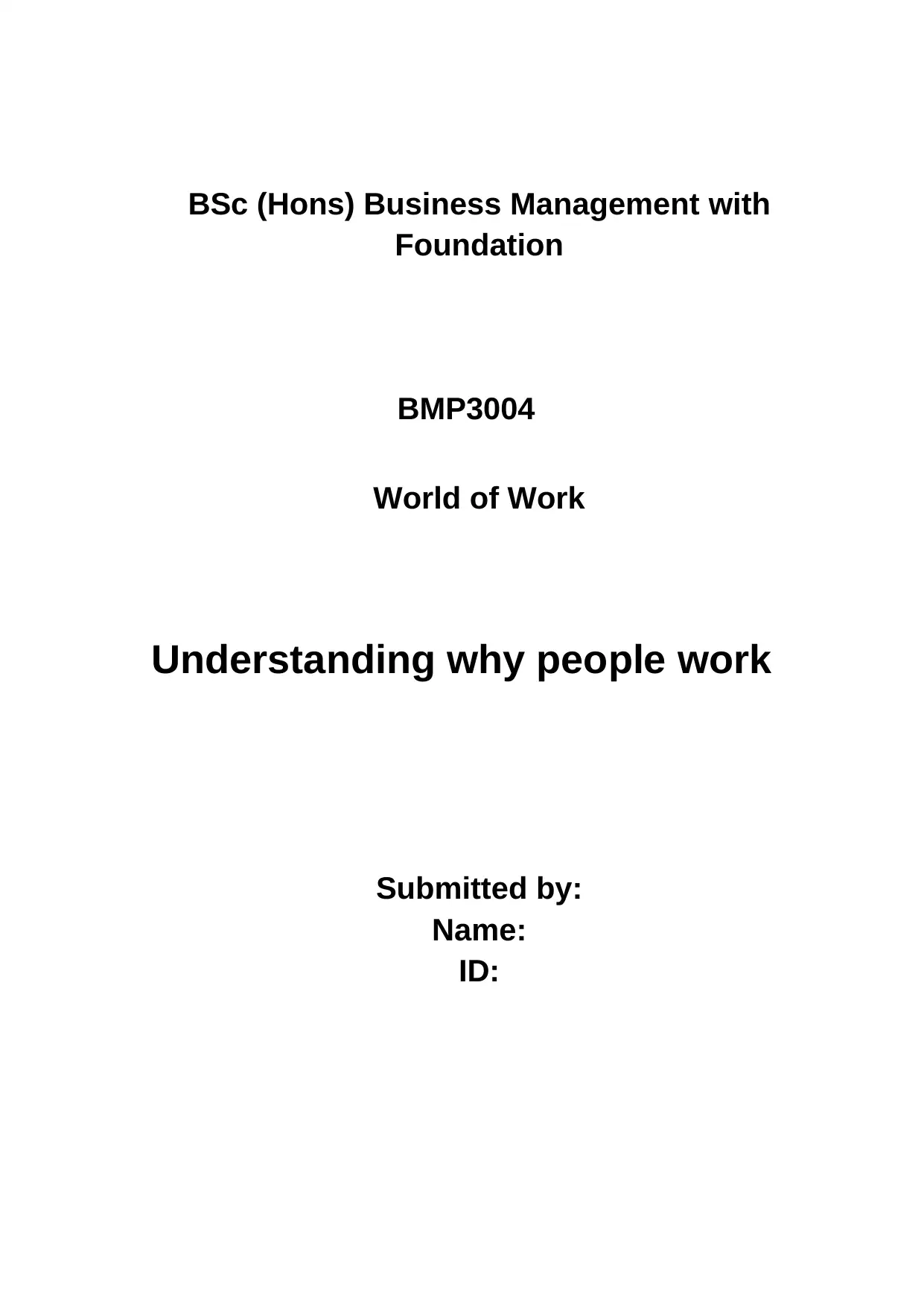
BSc (Hons) Business Management with
Foundation
BMP3004
World of Work
Understanding why people work
Submitted by:
Name:
ID:
Foundation
BMP3004
World of Work
Understanding why people work
Submitted by:
Name:
ID:
Paraphrase This Document
Need a fresh take? Get an instant paraphrase of this document with our AI Paraphraser
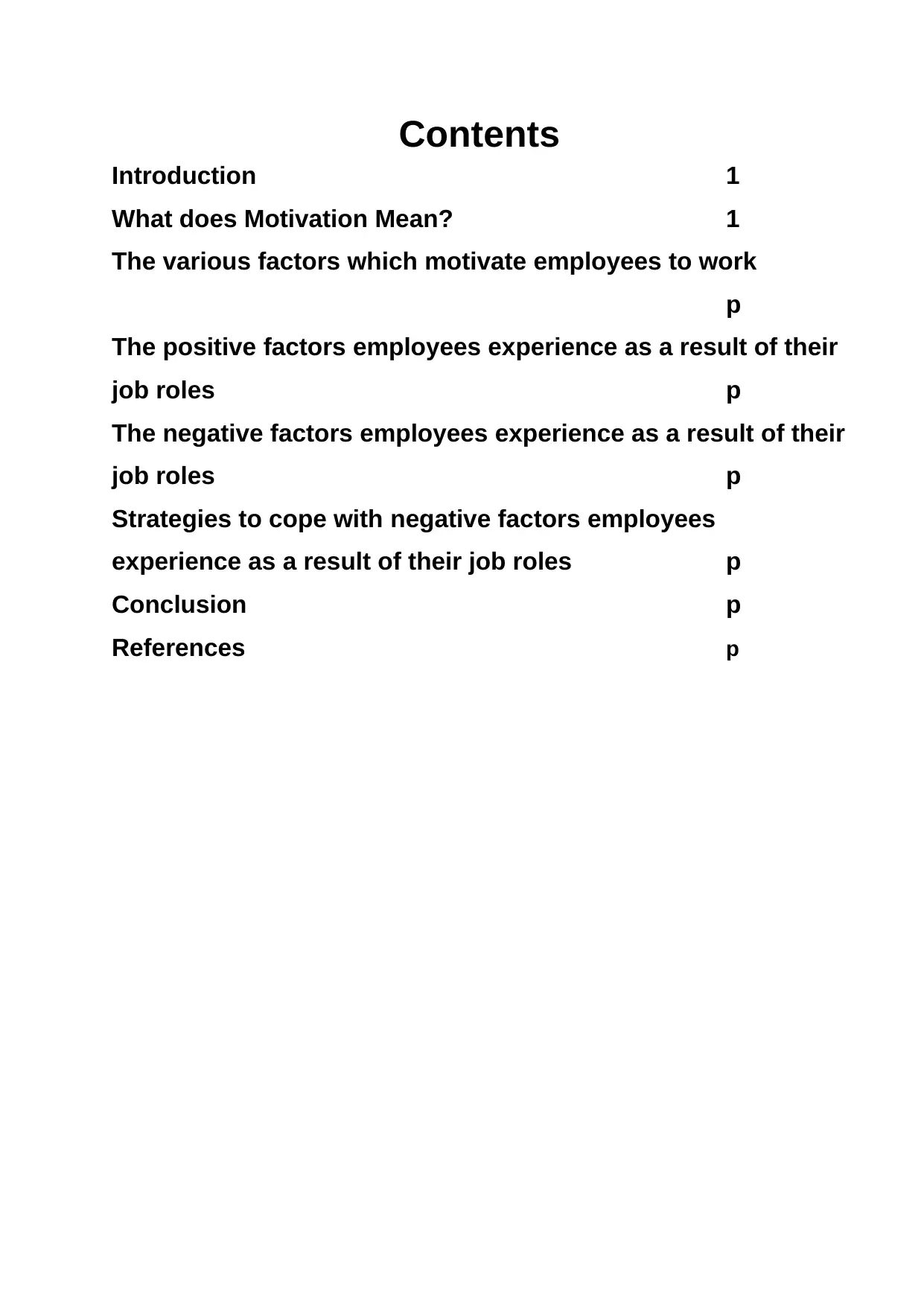
Contents
Introduction 1
What does Motivation Mean? 1
The various factors which motivate employees to work
p
The positive factors employees experience as a result of their
job roles p
The negative factors employees experience as a result of their
job roles p
Strategies to cope with negative factors employees
experience as a result of their job roles p
Conclusion p
References p
Introduction 1
What does Motivation Mean? 1
The various factors which motivate employees to work
p
The positive factors employees experience as a result of their
job roles p
The negative factors employees experience as a result of their
job roles p
Strategies to cope with negative factors employees
experience as a result of their job roles p
Conclusion p
References p
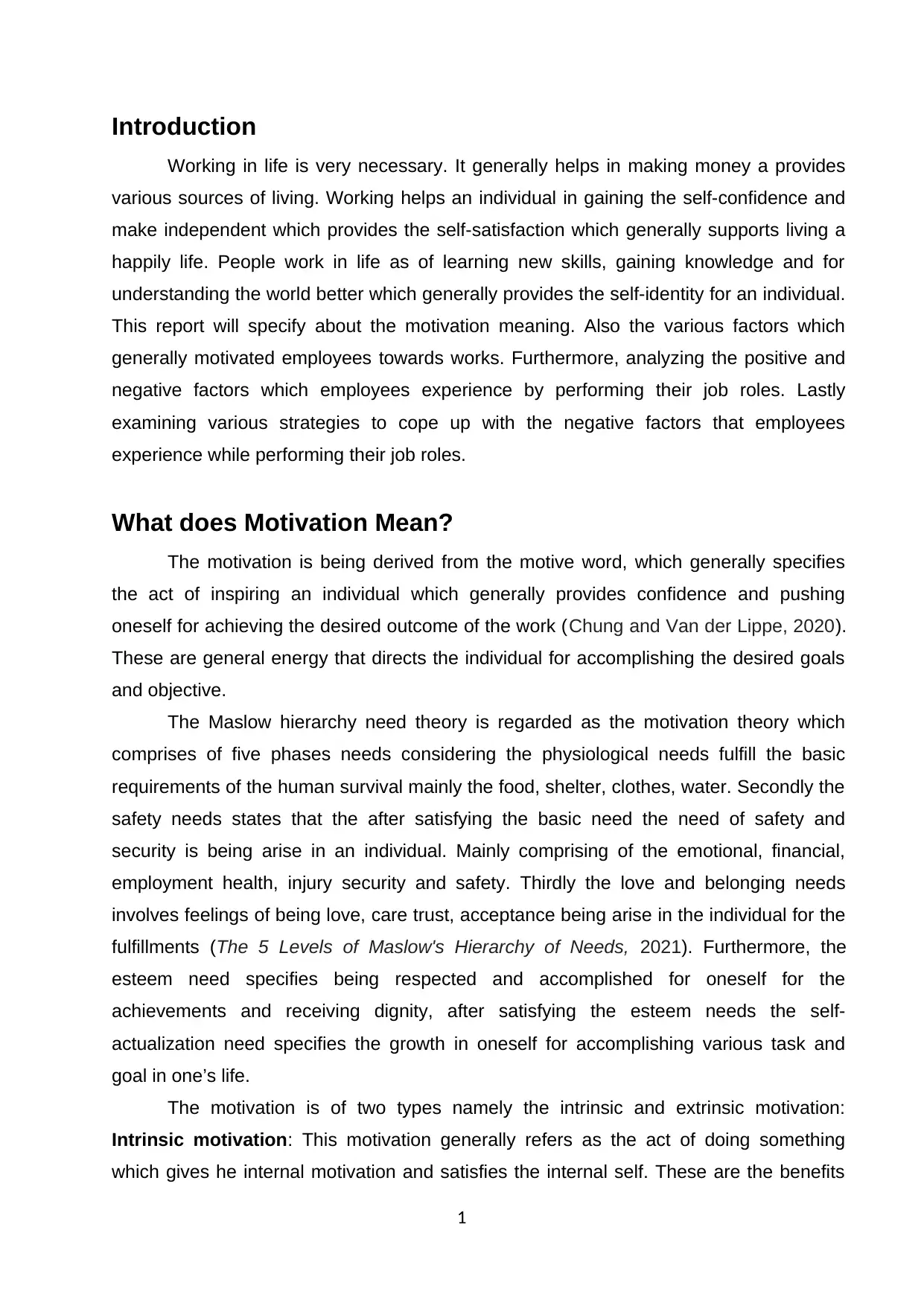
Introduction
Working in life is very necessary. It generally helps in making money a provides
various sources of living. Working helps an individual in gaining the self-confidence and
make independent which provides the self-satisfaction which generally supports living a
happily life. People work in life as of learning new skills, gaining knowledge and for
understanding the world better which generally provides the self-identity for an individual.
This report will specify about the motivation meaning. Also the various factors which
generally motivated employees towards works. Furthermore, analyzing the positive and
negative factors which employees experience by performing their job roles. Lastly
examining various strategies to cope up with the negative factors that employees
experience while performing their job roles.
What does Motivation Mean?
The motivation is being derived from the motive word, which generally specifies
the act of inspiring an individual which generally provides confidence and pushing
oneself for achieving the desired outcome of the work (Chung and Van der Lippe, 2020).
These are general energy that directs the individual for accomplishing the desired goals
and objective.
The Maslow hierarchy need theory is regarded as the motivation theory which
comprises of five phases needs considering the physiological needs fulfill the basic
requirements of the human survival mainly the food, shelter, clothes, water. Secondly the
safety needs states that the after satisfying the basic need the need of safety and
security is being arise in an individual. Mainly comprising of the emotional, financial,
employment health, injury security and safety. Thirdly the love and belonging needs
involves feelings of being love, care trust, acceptance being arise in the individual for the
fulfillments (The 5 Levels of Maslow's Hierarchy of Needs, 2021). Furthermore, the
esteem need specifies being respected and accomplished for oneself for the
achievements and receiving dignity, after satisfying the esteem needs the self-
actualization need specifies the growth in oneself for accomplishing various task and
goal in one’s life.
The motivation is of two types namely the intrinsic and extrinsic motivation:
Intrinsic motivation: This motivation generally refers as the act of doing something
which gives he internal motivation and satisfies the internal self. These are the benefits
1
Working in life is very necessary. It generally helps in making money a provides
various sources of living. Working helps an individual in gaining the self-confidence and
make independent which provides the self-satisfaction which generally supports living a
happily life. People work in life as of learning new skills, gaining knowledge and for
understanding the world better which generally provides the self-identity for an individual.
This report will specify about the motivation meaning. Also the various factors which
generally motivated employees towards works. Furthermore, analyzing the positive and
negative factors which employees experience by performing their job roles. Lastly
examining various strategies to cope up with the negative factors that employees
experience while performing their job roles.
What does Motivation Mean?
The motivation is being derived from the motive word, which generally specifies
the act of inspiring an individual which generally provides confidence and pushing
oneself for achieving the desired outcome of the work (Chung and Van der Lippe, 2020).
These are general energy that directs the individual for accomplishing the desired goals
and objective.
The Maslow hierarchy need theory is regarded as the motivation theory which
comprises of five phases needs considering the physiological needs fulfill the basic
requirements of the human survival mainly the food, shelter, clothes, water. Secondly the
safety needs states that the after satisfying the basic need the need of safety and
security is being arise in an individual. Mainly comprising of the emotional, financial,
employment health, injury security and safety. Thirdly the love and belonging needs
involves feelings of being love, care trust, acceptance being arise in the individual for the
fulfillments (The 5 Levels of Maslow's Hierarchy of Needs, 2021). Furthermore, the
esteem need specifies being respected and accomplished for oneself for the
achievements and receiving dignity, after satisfying the esteem needs the self-
actualization need specifies the growth in oneself for accomplishing various task and
goal in one’s life.
The motivation is of two types namely the intrinsic and extrinsic motivation:
Intrinsic motivation: This motivation generally refers as the act of doing something
which gives he internal motivation and satisfies the internal self. These are the benefits
1
⊘ This is a preview!⊘
Do you want full access?
Subscribe today to unlock all pages.

Trusted by 1+ million students worldwide
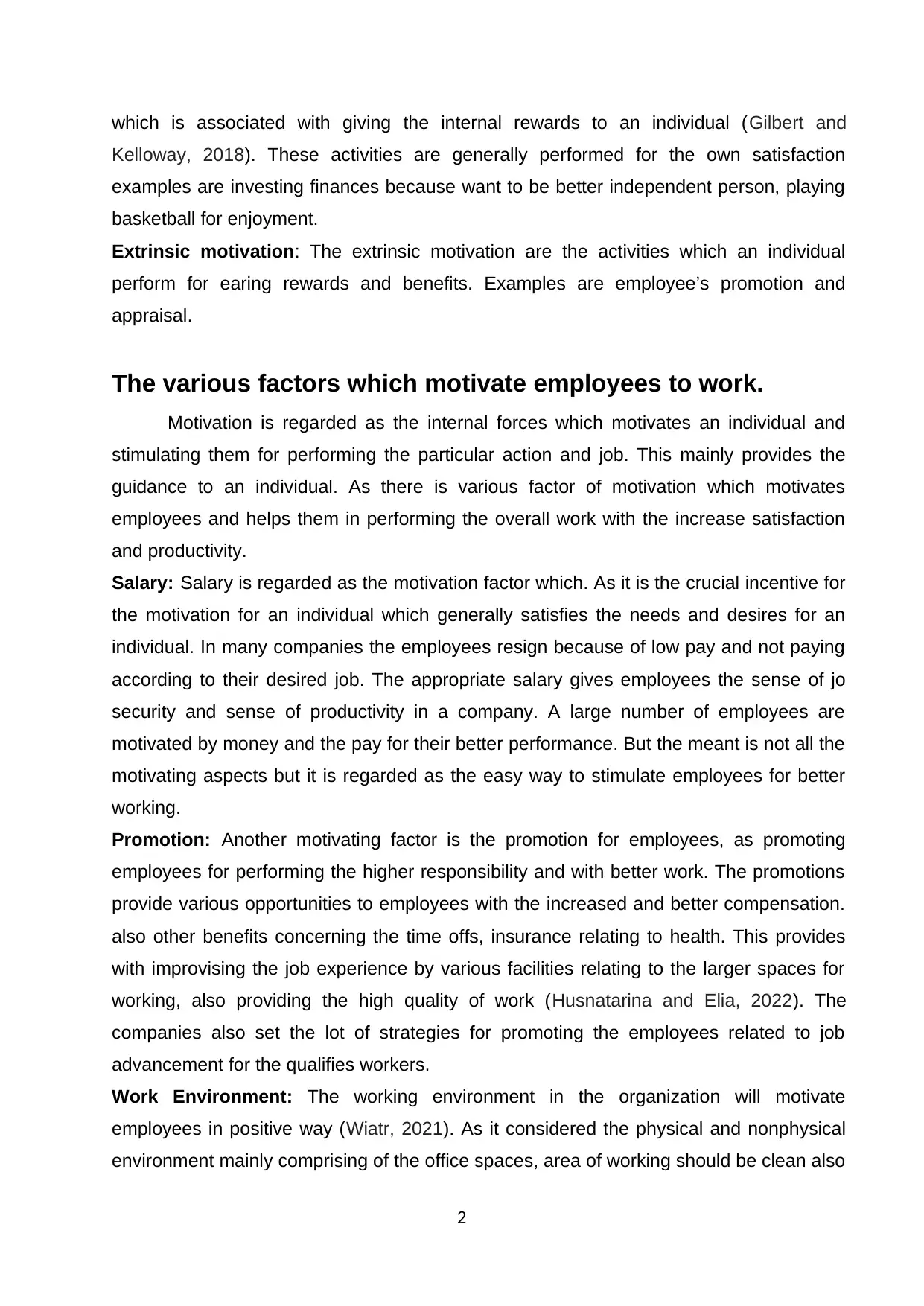
which is associated with giving the internal rewards to an individual (Gilbert and
Kelloway, 2018). These activities are generally performed for the own satisfaction
examples are investing finances because want to be better independent person, playing
basketball for enjoyment.
Extrinsic motivation: The extrinsic motivation are the activities which an individual
perform for earing rewards and benefits. Examples are employee’s promotion and
appraisal.
The various factors which motivate employees to work.
Motivation is regarded as the internal forces which motivates an individual and
stimulating them for performing the particular action and job. This mainly provides the
guidance to an individual. As there is various factor of motivation which motivates
employees and helps them in performing the overall work with the increase satisfaction
and productivity.
Salary: Salary is regarded as the motivation factor which. As it is the crucial incentive for
the motivation for an individual which generally satisfies the needs and desires for an
individual. In many companies the employees resign because of low pay and not paying
according to their desired job. The appropriate salary gives employees the sense of jo
security and sense of productivity in a company. A large number of employees are
motivated by money and the pay for their better performance. But the meant is not all the
motivating aspects but it is regarded as the easy way to stimulate employees for better
working.
Promotion: Another motivating factor is the promotion for employees, as promoting
employees for performing the higher responsibility and with better work. The promotions
provide various opportunities to employees with the increased and better compensation.
also other benefits concerning the time offs, insurance relating to health. This provides
with improvising the job experience by various facilities relating to the larger spaces for
working, also providing the high quality of work (Husnatarina and Elia, 2022). The
companies also set the lot of strategies for promoting the employees related to job
advancement for the qualifies workers.
Work Environment: The working environment in the organization will motivate
employees in positive way (Wiatr, 2021). As it considered the physical and nonphysical
environment mainly comprising of the office spaces, area of working should be clean also
2
Kelloway, 2018). These activities are generally performed for the own satisfaction
examples are investing finances because want to be better independent person, playing
basketball for enjoyment.
Extrinsic motivation: The extrinsic motivation are the activities which an individual
perform for earing rewards and benefits. Examples are employee’s promotion and
appraisal.
The various factors which motivate employees to work.
Motivation is regarded as the internal forces which motivates an individual and
stimulating them for performing the particular action and job. This mainly provides the
guidance to an individual. As there is various factor of motivation which motivates
employees and helps them in performing the overall work with the increase satisfaction
and productivity.
Salary: Salary is regarded as the motivation factor which. As it is the crucial incentive for
the motivation for an individual which generally satisfies the needs and desires for an
individual. In many companies the employees resign because of low pay and not paying
according to their desired job. The appropriate salary gives employees the sense of jo
security and sense of productivity in a company. A large number of employees are
motivated by money and the pay for their better performance. But the meant is not all the
motivating aspects but it is regarded as the easy way to stimulate employees for better
working.
Promotion: Another motivating factor is the promotion for employees, as promoting
employees for performing the higher responsibility and with better work. The promotions
provide various opportunities to employees with the increased and better compensation.
also other benefits concerning the time offs, insurance relating to health. This provides
with improvising the job experience by various facilities relating to the larger spaces for
working, also providing the high quality of work (Husnatarina and Elia, 2022). The
companies also set the lot of strategies for promoting the employees related to job
advancement for the qualifies workers.
Work Environment: The working environment in the organization will motivate
employees in positive way (Wiatr, 2021). As it considered the physical and nonphysical
environment mainly comprising of the office spaces, area of working should be clean also
2
Paraphrase This Document
Need a fresh take? Get an instant paraphrase of this document with our AI Paraphraser
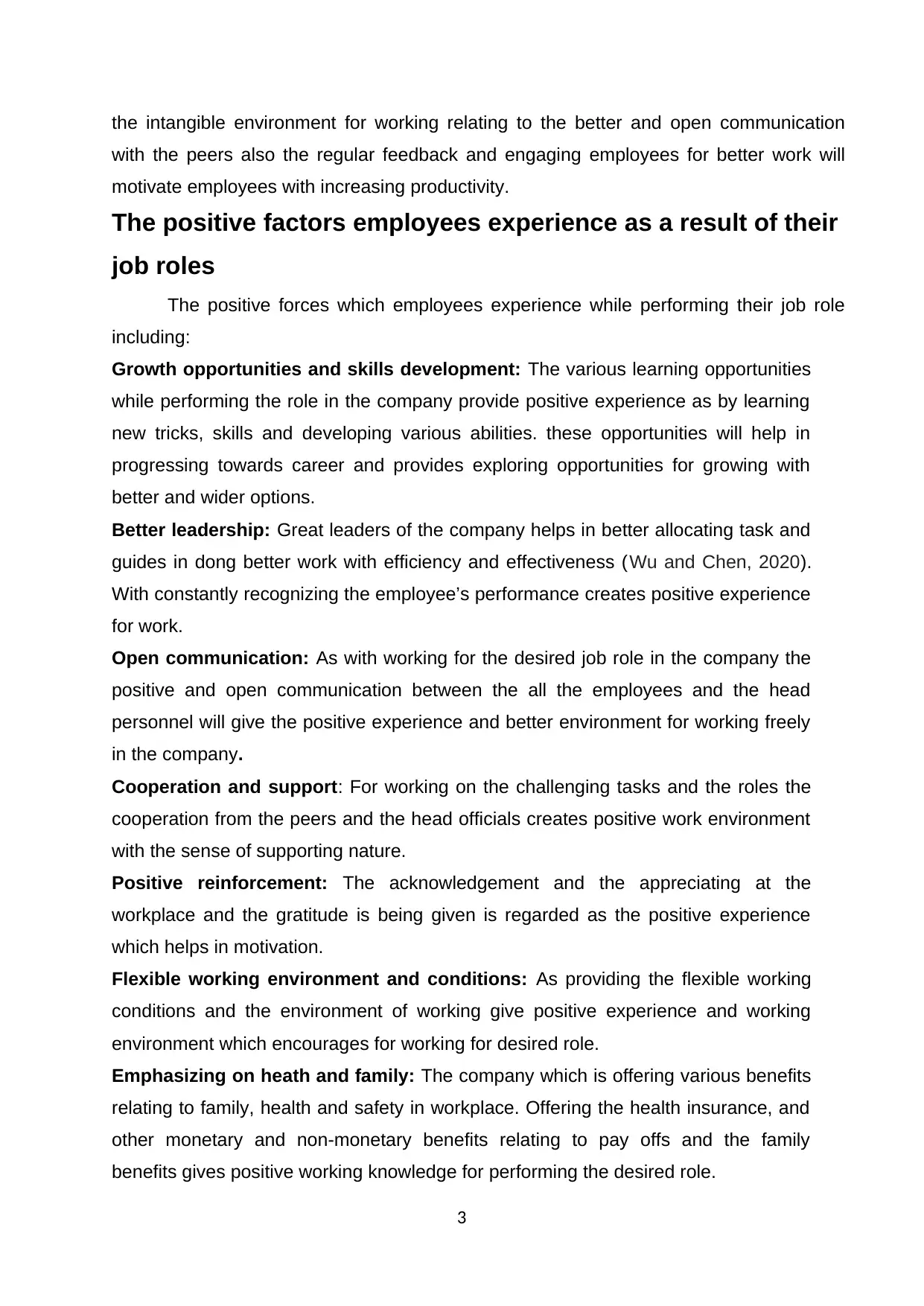
the intangible environment for working relating to the better and open communication
with the peers also the regular feedback and engaging employees for better work will
motivate employees with increasing productivity.
The positive factors employees experience as a result of their
job roles
The positive forces which employees experience while performing their job role
including:
Growth opportunities and skills development: The various learning opportunities
while performing the role in the company provide positive experience as by learning
new tricks, skills and developing various abilities. these opportunities will help in
progressing towards career and provides exploring opportunities for growing with
better and wider options.
Better leadership: Great leaders of the company helps in better allocating task and
guides in dong better work with efficiency and effectiveness (Wu and Chen, 2020).
With constantly recognizing the employee’s performance creates positive experience
for work.
Open communication: As with working for the desired job role in the company the
positive and open communication between the all the employees and the head
personnel will give the positive experience and better environment for working freely
in the company.
Cooperation and support: For working on the challenging tasks and the roles the
cooperation from the peers and the head officials creates positive work environment
with the sense of supporting nature.
Positive reinforcement: The acknowledgement and the appreciating at the
workplace and the gratitude is being given is regarded as the positive experience
which helps in motivation.
Flexible working environment and conditions: As providing the flexible working
conditions and the environment of working give positive experience and working
environment which encourages for working for desired role.
Emphasizing on heath and family: The company which is offering various benefits
relating to family, health and safety in workplace. Offering the health insurance, and
other monetary and non-monetary benefits relating to pay offs and the family
benefits gives positive working knowledge for performing the desired role.
3
with the peers also the regular feedback and engaging employees for better work will
motivate employees with increasing productivity.
The positive factors employees experience as a result of their
job roles
The positive forces which employees experience while performing their job role
including:
Growth opportunities and skills development: The various learning opportunities
while performing the role in the company provide positive experience as by learning
new tricks, skills and developing various abilities. these opportunities will help in
progressing towards career and provides exploring opportunities for growing with
better and wider options.
Better leadership: Great leaders of the company helps in better allocating task and
guides in dong better work with efficiency and effectiveness (Wu and Chen, 2020).
With constantly recognizing the employee’s performance creates positive experience
for work.
Open communication: As with working for the desired job role in the company the
positive and open communication between the all the employees and the head
personnel will give the positive experience and better environment for working freely
in the company.
Cooperation and support: For working on the challenging tasks and the roles the
cooperation from the peers and the head officials creates positive work environment
with the sense of supporting nature.
Positive reinforcement: The acknowledgement and the appreciating at the
workplace and the gratitude is being given is regarded as the positive experience
which helps in motivation.
Flexible working environment and conditions: As providing the flexible working
conditions and the environment of working give positive experience and working
environment which encourages for working for desired role.
Emphasizing on heath and family: The company which is offering various benefits
relating to family, health and safety in workplace. Offering the health insurance, and
other monetary and non-monetary benefits relating to pay offs and the family
benefits gives positive working knowledge for performing the desired role.
3
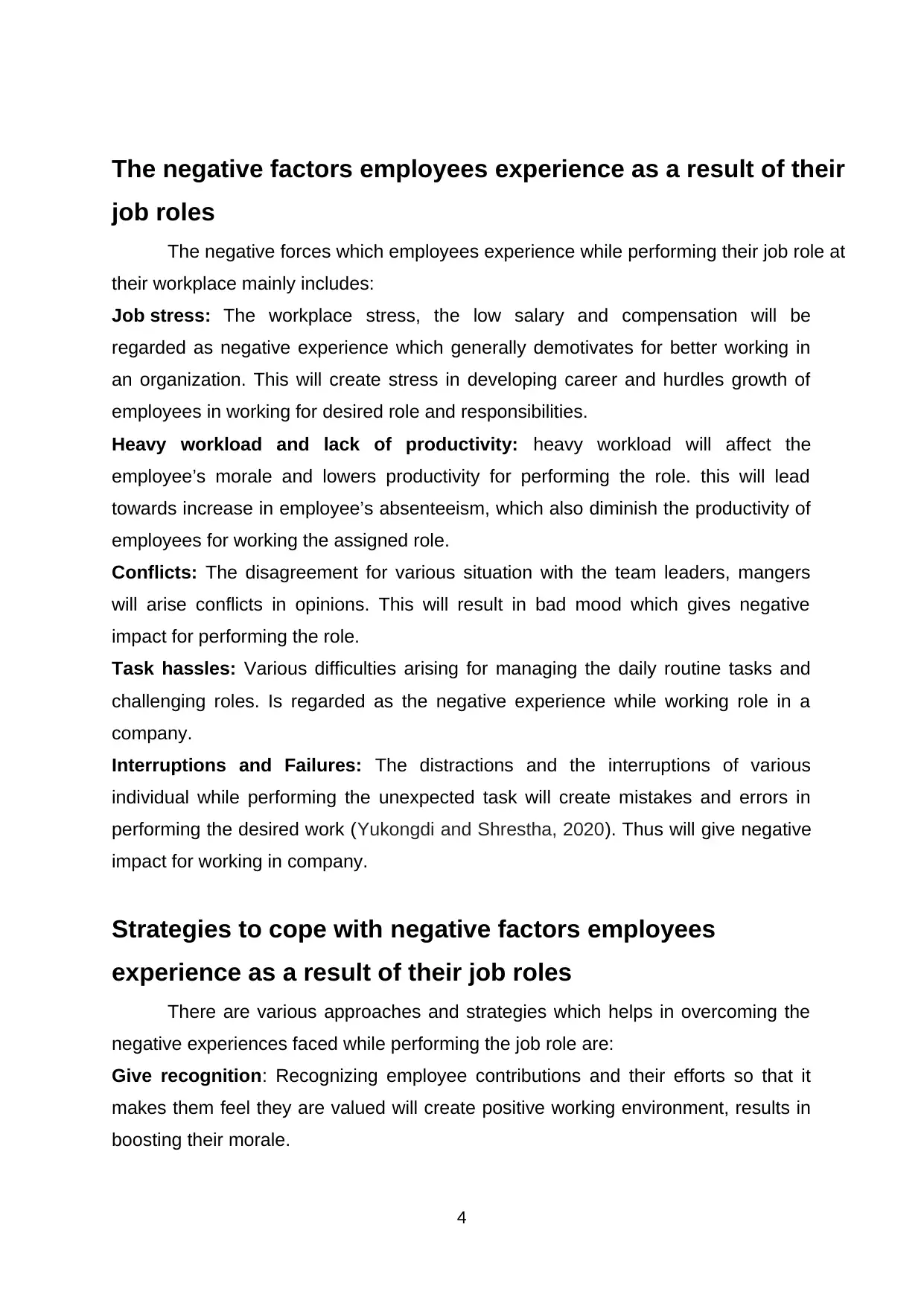
The negative factors employees experience as a result of their
job roles
The negative forces which employees experience while performing their job role at
their workplace mainly includes:
Job stress: The workplace stress, the low salary and compensation will be
regarded as negative experience which generally demotivates for better working in
an organization. This will create stress in developing career and hurdles growth of
employees in working for desired role and responsibilities.
Heavy workload and lack of productivity: heavy workload will affect the
employee’s morale and lowers productivity for performing the role. this will lead
towards increase in employee’s absenteeism, which also diminish the productivity of
employees for working the assigned role.
Conflicts: The disagreement for various situation with the team leaders, mangers
will arise conflicts in opinions. This will result in bad mood which gives negative
impact for performing the role.
Task hassles: Various difficulties arising for managing the daily routine tasks and
challenging roles. Is regarded as the negative experience while working role in a
company.
Interruptions and Failures: The distractions and the interruptions of various
individual while performing the unexpected task will create mistakes and errors in
performing the desired work (Yukongdi and Shrestha, 2020). Thus will give negative
impact for working in company.
Strategies to cope with negative factors employees
experience as a result of their job roles
There are various approaches and strategies which helps in overcoming the
negative experiences faced while performing the job role are:
Give recognition: Recognizing employee contributions and their efforts so that it
makes them feel they are valued will create positive working environment, results in
boosting their morale.
4
job roles
The negative forces which employees experience while performing their job role at
their workplace mainly includes:
Job stress: The workplace stress, the low salary and compensation will be
regarded as negative experience which generally demotivates for better working in
an organization. This will create stress in developing career and hurdles growth of
employees in working for desired role and responsibilities.
Heavy workload and lack of productivity: heavy workload will affect the
employee’s morale and lowers productivity for performing the role. this will lead
towards increase in employee’s absenteeism, which also diminish the productivity of
employees for working the assigned role.
Conflicts: The disagreement for various situation with the team leaders, mangers
will arise conflicts in opinions. This will result in bad mood which gives negative
impact for performing the role.
Task hassles: Various difficulties arising for managing the daily routine tasks and
challenging roles. Is regarded as the negative experience while working role in a
company.
Interruptions and Failures: The distractions and the interruptions of various
individual while performing the unexpected task will create mistakes and errors in
performing the desired work (Yukongdi and Shrestha, 2020). Thus will give negative
impact for working in company.
Strategies to cope with negative factors employees
experience as a result of their job roles
There are various approaches and strategies which helps in overcoming the
negative experiences faced while performing the job role are:
Give recognition: Recognizing employee contributions and their efforts so that it
makes them feel they are valued will create positive working environment, results in
boosting their morale.
4
⊘ This is a preview!⊘
Do you want full access?
Subscribe today to unlock all pages.

Trusted by 1+ million students worldwide
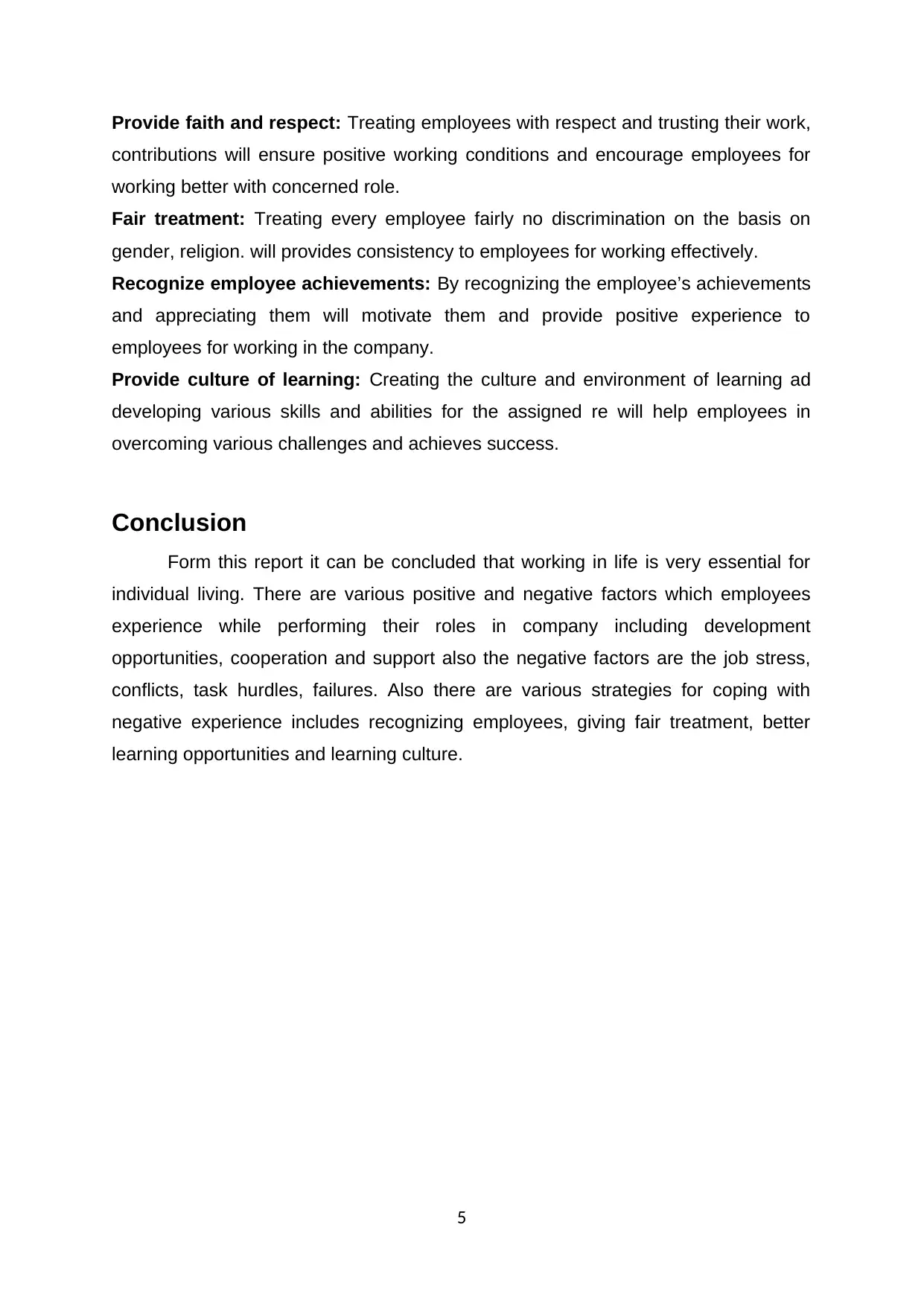
Provide faith and respect: Treating employees with respect and trusting their work,
contributions will ensure positive working conditions and encourage employees for
working better with concerned role.
Fair treatment: Treating every employee fairly no discrimination on the basis on
gender, religion. will provides consistency to employees for working effectively.
Recognize employee achievements: By recognizing the employee’s achievements
and appreciating them will motivate them and provide positive experience to
employees for working in the company.
Provide culture of learning: Creating the culture and environment of learning ad
developing various skills and abilities for the assigned re will help employees in
overcoming various challenges and achieves success.
Conclusion
Form this report it can be concluded that working in life is very essential for
individual living. There are various positive and negative factors which employees
experience while performing their roles in company including development
opportunities, cooperation and support also the negative factors are the job stress,
conflicts, task hurdles, failures. Also there are various strategies for coping with
negative experience includes recognizing employees, giving fair treatment, better
learning opportunities and learning culture.
5
contributions will ensure positive working conditions and encourage employees for
working better with concerned role.
Fair treatment: Treating every employee fairly no discrimination on the basis on
gender, religion. will provides consistency to employees for working effectively.
Recognize employee achievements: By recognizing the employee’s achievements
and appreciating them will motivate them and provide positive experience to
employees for working in the company.
Provide culture of learning: Creating the culture and environment of learning ad
developing various skills and abilities for the assigned re will help employees in
overcoming various challenges and achieves success.
Conclusion
Form this report it can be concluded that working in life is very essential for
individual living. There are various positive and negative factors which employees
experience while performing their roles in company including development
opportunities, cooperation and support also the negative factors are the job stress,
conflicts, task hurdles, failures. Also there are various strategies for coping with
negative experience includes recognizing employees, giving fair treatment, better
learning opportunities and learning culture.
5
Paraphrase This Document
Need a fresh take? Get an instant paraphrase of this document with our AI Paraphraser
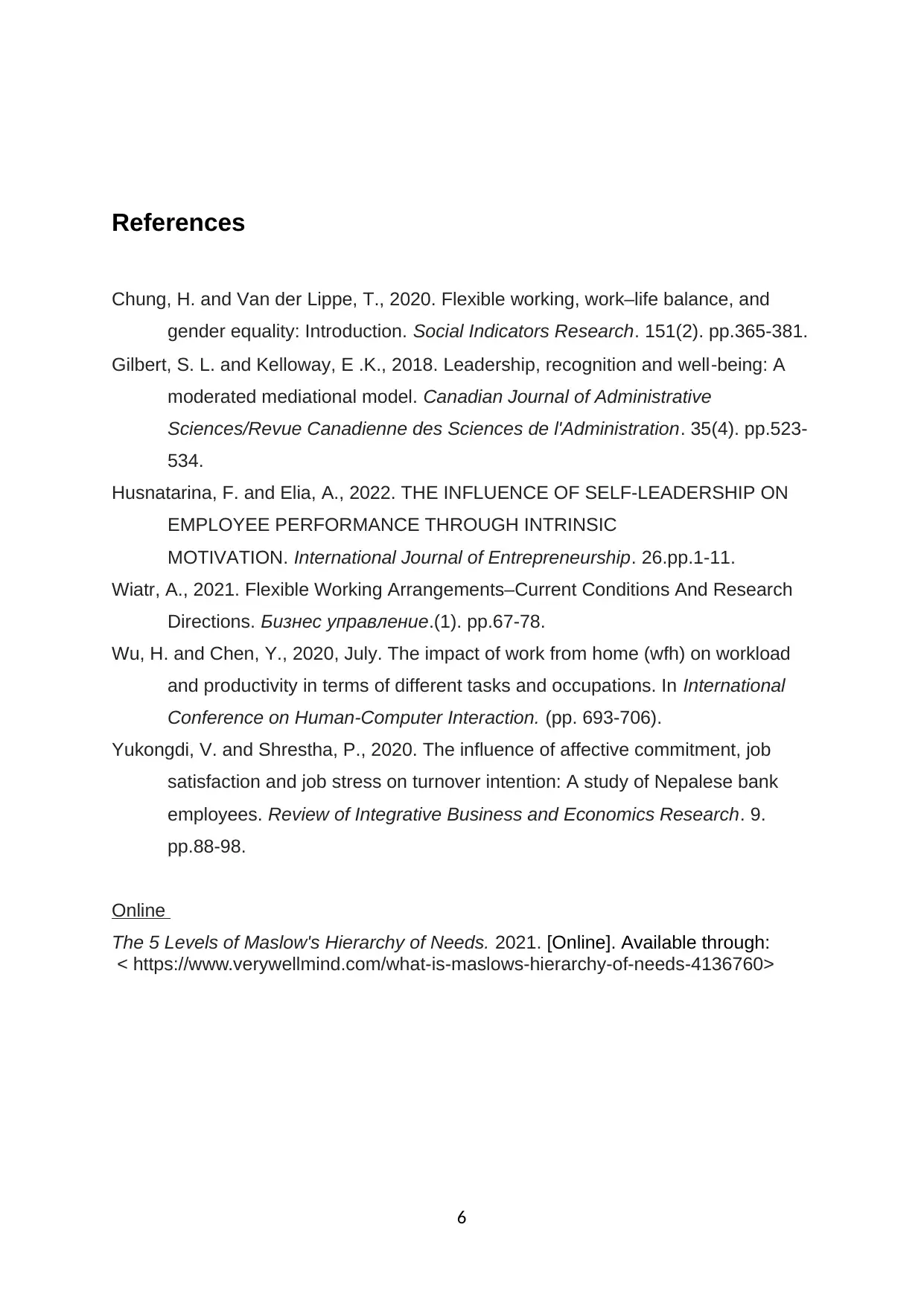
References
Chung, H. and Van der Lippe, T., 2020. Flexible working, work–life balance, and
gender equality: Introduction. Social Indicators Research. 151(2). pp.365-381.
Gilbert, S. L. and Kelloway, E .K., 2018. Leadership, recognition and well‐being: A
moderated mediational model. Canadian Journal of Administrative
Sciences/Revue Canadienne des Sciences de l'Administration. 35(4). pp.523-
534.
Husnatarina, F. and Elia, A., 2022. THE INFLUENCE OF SELF-LEADERSHIP ON
EMPLOYEE PERFORMANCE THROUGH INTRINSIC
MOTIVATION. International Journal of Entrepreneurship. 26.pp.1-11.
Wiatr, A., 2021. Flexible Working Arrangements–Current Conditions And Research
Directions. Бизнес управление.(1). pp.67-78.
Wu, H. and Chen, Y., 2020, July. The impact of work from home (wfh) on workload
and productivity in terms of different tasks and occupations. In International
Conference on Human-Computer Interaction. (pp. 693-706).
Yukongdi, V. and Shrestha, P., 2020. The influence of affective commitment, job
satisfaction and job stress on turnover intention: A study of Nepalese bank
employees. Review of Integrative Business and Economics Research. 9.
pp.88-98.
Online
The 5 Levels of Maslow's Hierarchy of Needs. 2021. [Online]. Available through:
< https://www.verywellmind.com/what-is-maslows-hierarchy-of-needs-4136760>
6
Chung, H. and Van der Lippe, T., 2020. Flexible working, work–life balance, and
gender equality: Introduction. Social Indicators Research. 151(2). pp.365-381.
Gilbert, S. L. and Kelloway, E .K., 2018. Leadership, recognition and well‐being: A
moderated mediational model. Canadian Journal of Administrative
Sciences/Revue Canadienne des Sciences de l'Administration. 35(4). pp.523-
534.
Husnatarina, F. and Elia, A., 2022. THE INFLUENCE OF SELF-LEADERSHIP ON
EMPLOYEE PERFORMANCE THROUGH INTRINSIC
MOTIVATION. International Journal of Entrepreneurship. 26.pp.1-11.
Wiatr, A., 2021. Flexible Working Arrangements–Current Conditions And Research
Directions. Бизнес управление.(1). pp.67-78.
Wu, H. and Chen, Y., 2020, July. The impact of work from home (wfh) on workload
and productivity in terms of different tasks and occupations. In International
Conference on Human-Computer Interaction. (pp. 693-706).
Yukongdi, V. and Shrestha, P., 2020. The influence of affective commitment, job
satisfaction and job stress on turnover intention: A study of Nepalese bank
employees. Review of Integrative Business and Economics Research. 9.
pp.88-98.
Online
The 5 Levels of Maslow's Hierarchy of Needs. 2021. [Online]. Available through:
< https://www.verywellmind.com/what-is-maslows-hierarchy-of-needs-4136760>
6
1 out of 8
Related Documents
Your All-in-One AI-Powered Toolkit for Academic Success.
+13062052269
info@desklib.com
Available 24*7 on WhatsApp / Email
![[object Object]](/_next/static/media/star-bottom.7253800d.svg)
Unlock your academic potential
Copyright © 2020–2025 A2Z Services. All Rights Reserved. Developed and managed by ZUCOL.


